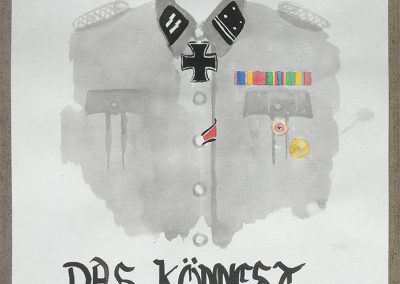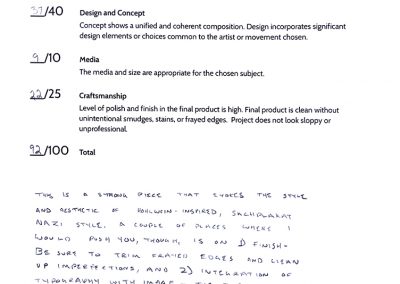Departmental Requirements
According to the Department of Art + Design:
(In addition to the criteria and examples provided in the “Guidelines and Procedures,” the department adds the following). The effectiveness of the faculty member’s instruction will be documented in a portfolio. The portfolio could contain, but is not limited to:
Honors Projects
Supervision of student Honors projects relating to art.
Critiques
Conducting critiques: group, small group, and individual
Trip Lectures
Didactic lectures on student trips
Mentoring
Display and Archiving
Juried Competitions
Honors Projects
Supervision of student Honors projects relating to art.
Honors Colloquia
Think Wrong: An Honors Colloquium on Design Thinking // Spring 2016
Co-Taught with Dr. Nil Santana
In this course students explored creative methods in problem solving combined with principles of design thinking. By embracing interdisciplinary collaboration, promoting empathetic observations, and encouraging iterative, exploratory processes, this course will sought to cultivate lateral thinking across multiple contexts. Through the course students created a working prototype for a large-scale public service solution based on traffic patterns.
Escape the Classroom: An Exercise in Experiential Gaming // Spring 2019, 2022, *2024
Co-Taught twice with Dr. Kyle Dickson
In this colloquium we explored the concept of escape rooms as a means to create an immersive, engaging experience that challenged students to solve problems, develop new skills, and ask a wider range of questions. Our class began by researching a new form of social play known as an escape room by combining experiences they shared with classmates at North Texas Escape Rooms in Plano and McKinney. Then, we surveyed emerging models and approaches being developed around the country for escape rooms as a new context for learning. For their final project, teams worked together to produce an escape room experience that was tested and shared with classmates and campus volunteers.
Propaganda: The Architecture and Graphic Design of Totalitarian Regimes // Spring 2020
Co-Taught with Prof. Ronnie Rama
Architecture and graphic design are powerful political and ideological tools. This colloquium looked at propaganda and the ways totalitarian governments in the twentieth century leveraged architecture and graphic design as a means to disseminate ruthless agendas of domination, exploitation, and suppression.
Honors Classes
Honors Cornerstone // Fall 2013, Fall 2014
I have been invited by the Honors college on two occasions to teach an Honors section of Cornerstone. These were sections that were designed to be more academically rigorous, proceed at a faster pace and cover more material than non-Honors Cornerstone classes.
Honors Contracts
-
-
Sunshine Taylor, ART 222: Art History General Survey II // Spring 2021
-
Emma Harper, ART 222: Art History General Survey II // Spring 2021
-
Emily Osbourn, ART 222: Art History General Survey II // Spring 2021
-
Genevieve Graessle , ART 222: Art History General Survey II // Spring 2021
-
Meredith Hickl, ART 222: Art History General Survey II // Spring 2021
- Sonia Seguin, ART 440: Graphic Design History // Spring 2021
-
Samantha Cole, ART 221: Art History General Survey I // Fall 2020
-
Eowyn Stewart, ART 221: Art History General Survey I // Fall 2020
-
Carlisle Ross, ART 221: Art History General Survey I // Spring 2020
-
Megan Klimisch, ART 221: Art History General Survey I // Fall 2020
-
Caleb Daniel, CORE 110: Cornerstone // Fall 2019
-
Riley Fisher, ART 221: Art History General Survey I // Fall 2019
-
Arriana Monsey, ART 221: Art History General Survey I // Fall 2019
-
Jessica Halbert, ART 221: Art History General Survey I // Spring 2019
-
Emily Clunn, ART 105: 2D Design // Spring 2019
- Katelyn Zak, ART 105: 2D Design // Fall 2018
- Julia Teel, ART 222: Art History General Survey II // Spring 2017
- Brijin Hartrick, ART 222: Art History General Survey II // Spring 2017
- Hannakate Hall, CORE 310: The Search for Meaning // Spring 2016
- Jesse Jaynes, CORE 210: Human Identity and Community // Spring 2015
- Kayla Holcomb, CORE 210: Human Identity and Community // Spring 2015
- McKinley Terry, CORE 210: Human Identity and Community // Spring 2015
- Sarah Tutor, CORE 310: The Search for Meaning // Fall 2014
- Lacey Medlock, CORE 310: The Search for Meaning // Fall 2013
- Garrett Johnson, CORE 310: The Search for Meaning // Fall 2013
-
Mentoring
Supervision of undergraduate student research projects.
Student Research
-
- *Ashley Lang, Poster Competition, ACU Undergraduate Research, Innovation, and Creativity festival // Spring 2022
- Rebekah Conder, Poster Competition, ACU Undergraduate Research, Innovation, and Creativity festival // Spring 2022
- Ashley Lang and Sonia Seguin, Arts and Humanities Top Scholars Presentation, ACU Undergraduate Research, Innovation, and Creativity festival // Spring 2022
- Sonia Seguin, Poster Competition, ACU Undergraduate Research, Innovation, and Creativity festival // Spring 2022
- Courtney White, Poster Competition, ACU Undergraduate Research, Innovation, and Creativity festival // Spring 2022
- Julia Teel, Abilene Christian University, Senior Thesis Advisor // Fall 2018
- Julia Teel, Abilene Christian University, ACU Undergraduate Research Festival // Spring 2018
- Faith Moore, ACU Undergraduate Research Festival // Spring 2016
- Audrey Kinzinger, ACU Undergraduate Research Festival // Spring 2016
- Ashley McHam, Lubbock Christian University, Student Show Advisor // Spring 2010
- Heather Fittz, Lubbock Christian University, Student Show Advisor // Spring 2007
*Winner of the ACU Undergraduate Research, Creativity, and Innovation and Festival Poster Competition, Arts and Humanities Division
- *Ashley Lang, Poster Competition, ACU Undergraduate Research, Innovation, and Creativity festival // Spring 2022
Critiques
Conducting critiques: group, small group, and individual
Classroom Critiques
Critiques are an essential part of teaching art. Students learn, not only in the production of their works, but also in the critiquing of it. A good critique provides unique opportunities for peer assessment, plays a fundamental role in the development of language skills related to describing art and diagnosing its challenges and strengths, and provides valuable feedback for students to improve upon their work.
In my studio courses, I regularly employ both oral and written critiques as part of my teaching strategy. In addition, I provide different opportunities for critique in multiple settings including: class, group, small group, and individual critiques.
Since I first began teaching studio courses in 2009, my approach to critiques has changed in a number of ways. I have grown stronger in my own personal critiques of student works, but more importantly I have also developed better strategies for getting students to speak during critique sessions. I now keep detailed records of who spoke and, if possible, what they said which is reflected in students’ participation grades at the end of the course.
From a pedagogical standpoint, I have also come to the realization that critiques are most effective when the project doesn’t end with the evaluation. Art making is an iterative process and, therefore, I have found that students need time to implement some of the changes mentioned during the critique before submitting their final products. For this reason, I now allow students to return to assignments after critiques in order to take their peers’ feedback and implement it into their work.
Departmental Critiques
-
- Senior Portfolio Reviews // 2016-Present
- Graphic Design Concentration Reviews // 2016-Present
- Junior Graphic Design Portfolio Reviews // 2016-Present
- Senior Graphic DesignPortfolio Reviews // 2016-Present
Artwork Critique Examples
Trip Lectures
Didactic lectures on student trips
Organized Departmental Field Trip
Each fall, I organize a field trip to Dallas for the entire Department of Art and Design. Typically, this involves organizing bus travel, meals, and museum visitation for about 125 students, plus 6 faculty. In the trip, we visit the metroplex and are able to visit the Dallas Museum of Art, Kimbell Museum, Amon Carter Museum, and Fort Worth Modern Museum. I started this trip in 2018 and it has been a huge success for the department.
Organized Guest Lectures on Trips
-
- Mike Cobb, Director of Marketing, Balfour Publishing, Graphic Design History // Spring 2017
- Clampitt Paper School, Graphic Design History // Spring 2017
- Robert Frazier, Former U.S. Diplomat to Saudi Arabia, The Search for Meaning // Spring 2014
- Rolando Diaz, Painter, Design 1 // Fall 2013
- Stephen McGee, Artist, Design 1 // Fall 2013
Display and Archiving
Displaying Work
Displaying work is an important aspect of making art. Art requires vulnerability, allowing one’s self to be seen by others. For this reason, I frequently display my students’ artwork around the department and classroom after critiques. This allows not only their class peers to view their work, but exposes their work to all of the classes that meet in the room.
Archiving work is important for a number of reasons. First, it provides both good and bad examples for future classes to help students understand assignments better. It is also a helpful resource for me to use whenever I am planning my courses and assignments for next year. Looking back on the previous year’s work, I can reflect upon what worked well and what didn’t. It is also helpful when meeting with other faculty as we plan out projects and to meet course and major objectives.
Juried Competitions
Jury Experience
-
- Student Competition Juror: Abilene Christian University // 2017-Present
- Juror for the Texas Art Education Association VASE (Visual Arts Scholastic Event) // 2013
- Juror for the Scholastic Art & Writing Awards Competition // 2013
- Senior Show Juror/Advisor: Wayland Baptist University // 2011-2013
- Senior Show Juror/Advisor: Lubbock Christian University // 2008-2011
Welcome
Summary
Curriculum Vitae
Support Materials
I. Teaching
Reflection on Teaching Effectiveness
University Requirements
Departmental Requirements
II. Scholarship
Reflection on Scholarship
Scholarship Inventory
Scholarship Highlights
III. Service
University Requirements
Departmental Requirements
IV. Collegiality
Reflection on Collegiality
Significant Partnerships and Collaborations


